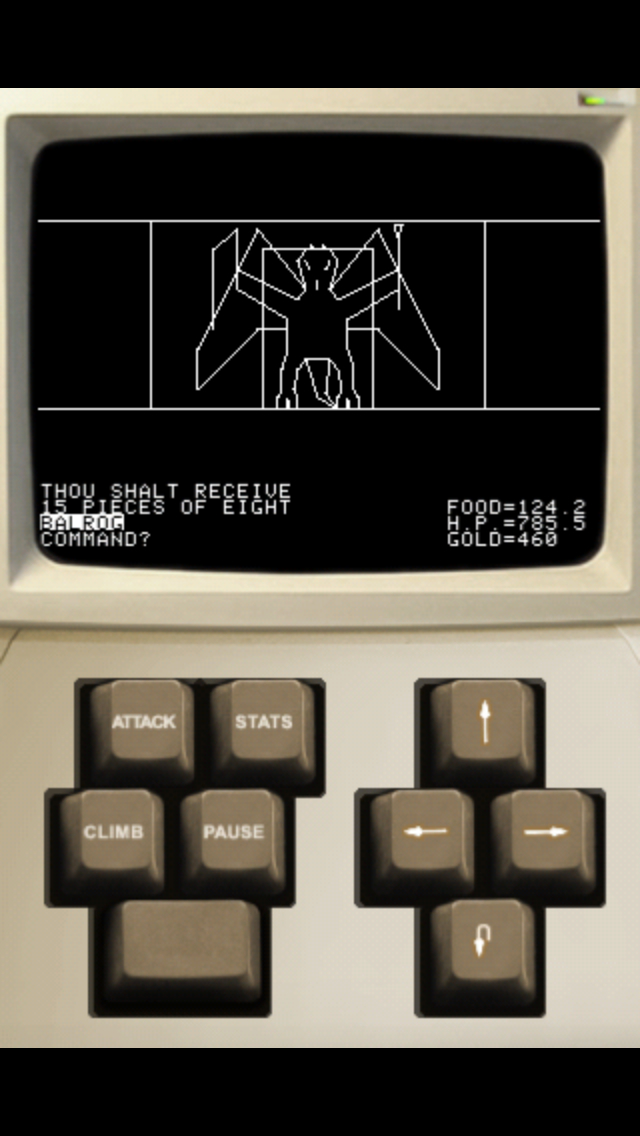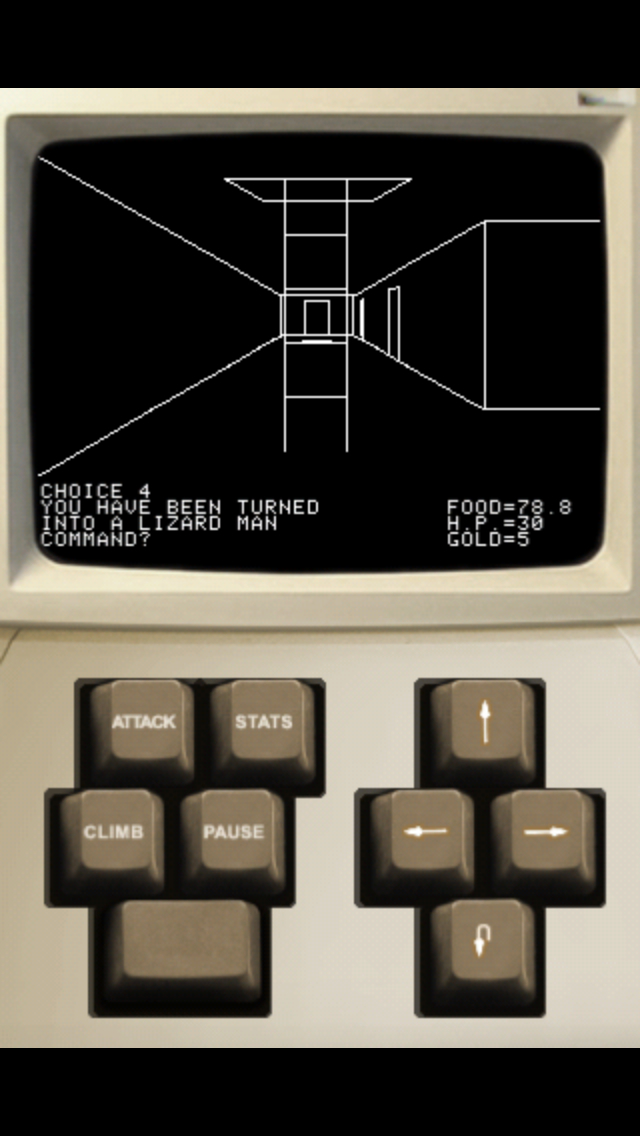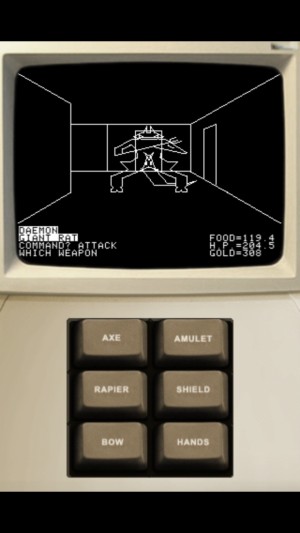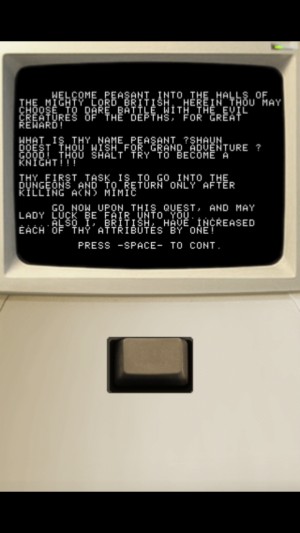![]() Hello, gentle readers, and welcome to the RPG Reload, the weekly feature where we often take marching orders from a guy named British. Each week, we take a look at an RPG from the App Store’s past to see how it holds up in the modern day. It’s a chance to revisit some classics, take a deeper dive than reviews allow for, or even just to reflect on the ever-expanding history of mobile RPGs and how certain games fit into it. For the most part, I set the schedule, and while I try to present a diverse line-up, just to make things interesting, I throw the choice over to you, the reader, once in a while. The next reader’s choice article will be next week and will be covering Knights Of Pen & Paper ($4.99), a suggestion offered by reader Andre Garcia. If you want to put your choice in as a potential candidate for the next reader’s choice article in February, simply post a comment below, drop by the Official RPG Reload Club thread in the forums, or tweet to @RPGReload. A roll of the dice determines the winner, so everyone has a chance, no matter how obscure their selection!
Hello, gentle readers, and welcome to the RPG Reload, the weekly feature where we often take marching orders from a guy named British. Each week, we take a look at an RPG from the App Store’s past to see how it holds up in the modern day. It’s a chance to revisit some classics, take a deeper dive than reviews allow for, or even just to reflect on the ever-expanding history of mobile RPGs and how certain games fit into it. For the most part, I set the schedule, and while I try to present a diverse line-up, just to make things interesting, I throw the choice over to you, the reader, once in a while. The next reader’s choice article will be next week and will be covering Knights Of Pen & Paper ($4.99), a suggestion offered by reader Andre Garcia. If you want to put your choice in as a potential candidate for the next reader’s choice article in February, simply post a comment below, drop by the Official RPG Reload Club thread in the forums, or tweet to @RPGReload. A roll of the dice determines the winner, so everyone has a chance, no matter how obscure their selection!
Having refreshed myself with a two-week holiday while forcing you guys to endure a couple of holiday specials, I’m ready to hit the ground running in 2015. We’ll see an oft-requested game later this month, and I’ve even heard some whispers about a potential RPG Reload podcast, if you’re the sort that listens to such scuttlebutt. Before we get into all that, however, I wanted to go back to an old-school RPG to start off the year. It doesn’t get much more old-school than this week’s game, Akalabeth: World Of Doom! ($1.99), the first computer RPG from Richard Garriott, more famously known as Lord British. It’s sometimes referred to as Ultima 0, as it’s the direct predecessor to that series which would help define role-playing video games. It also shares certain elements with Ultima, such as first-person dungeons, an overworld map, and a certain pushy monarch. I’m sure it’s clear by now to my cherished readers that I have a real affection for the genre and its history, and there’s no doubt Akalabeth is vital in that context.
The history of the game is a little muddy, but the broad strokes are clear enough, even if some of the specifics might be more legend than fact. Akalabeth is, as mentioned, the work of Richard Garriott, the famed designer behind the Ultima series, and a man whose contributions to the genre really can’t be overstated. Garriott, the British-born son of an American astronaut, took an early interest in computers and pursued that interest with such passion that he ended up creating his own self-directed programming class in high school when the regular program failed to satisfy his needs. Like many young people at the time, Garriott was also a pretty big fan of The Lord Of The Rings and Dungeons & Dragons, and it was only a matter of time before he brought those interests together. In Akalabeth‘s early stages, in fact, the inspiration is more than clear, as it was developed under the working title of D&D. Its final title is only marginally less subtle.
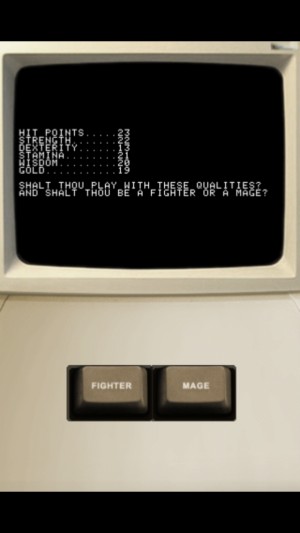 Akalabeth: World Of Doom! officially saw the light of day in 1979, with the disks packaged in Ziploc bags with a photocopied manual for the low price of $20, initially sold exclusively at the computer store where Garriott worked. I’m not sure how many copies were sold in this form, with the only number I found in my research saying it was less then a dozen, but the important thing is that one copy ended up in the hands of California Pacific Computer Company. This was one of the many publishing companies that sprang up in the early period of computer gaming and disappeared scant years later. They had the financial muscle and the connections to get Akalabeth out to a wider audience, and offered Garriott $5 per copy sold. The deal was signed and the game was given a full release in 1980. According to Garriott, he received $150,000 from the sales of Akalabeth, which would peg it at 30,000 copies sold through to customers. It’s a paltry number by today’s standards, but in its era, those kind of sales would mean the game was a major hit.
Akalabeth: World Of Doom! officially saw the light of day in 1979, with the disks packaged in Ziploc bags with a photocopied manual for the low price of $20, initially sold exclusively at the computer store where Garriott worked. I’m not sure how many copies were sold in this form, with the only number I found in my research saying it was less then a dozen, but the important thing is that one copy ended up in the hands of California Pacific Computer Company. This was one of the many publishing companies that sprang up in the early period of computer gaming and disappeared scant years later. They had the financial muscle and the connections to get Akalabeth out to a wider audience, and offered Garriott $5 per copy sold. The deal was signed and the game was given a full release in 1980. According to Garriott, he received $150,000 from the sales of Akalabeth, which would peg it at 30,000 copies sold through to customers. It’s a paltry number by today’s standards, but in its era, those kind of sales would mean the game was a major hit.
The game was coded in Applesoft BASIC and, for a long time, was only available for Apple II computers. While there were unofficial DOS ports in the intervening years, Akalabeth officially hit its second platform in 1998 when it was published as part of the Ultima Collection. While Garriott’s more famous series remains in the hands of a publisher who seems to have little interest in it, Akalabeth seems to no longer be part of the package, as the game was officially ported to iOS in June of 2010 by developer Quantum Toast. It’s more or less a direct port of the Apple II version with a couple of optional modifications thrown in for good measure. I’ll go into the differences in more detail later on. It’s enough to say that this is probably the best version of Akalabeth, however meager an award that may be.
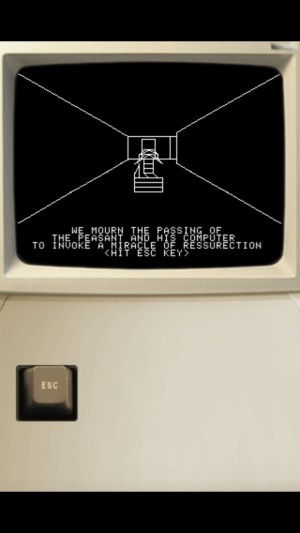 As you probably already know or have likely guessed, Akalabeth is a very rough game. I don’t mean that in the “euphemism for bad" kind of way, but rather in the sense of a somewhat crude pencil draft. The intentions of the game are clear enough, but Garriott, like his peers, hadn’t quite hashed out how to realize them by this point. It’s very important to keep in mind that by the time Akalabeth had released, you could probably count the number of officially released role-playing video games on two hands with a few digits to spare. Nobody knew exactly what to do, and most of the attempts up to that point were essentially variants on 1975’s The Dungeon. While Akalabeth wasn’t the first RPG to feature first-person dungeons, having been beaten to the punch by Moria, they certainly helped the game stand out. In Garriott’s earlier work, the dungeons used a familiar top-down perspective, but after playing a maze game called Escape, he decided Akalabeth‘s dungeons would use a first-person wireframe view.
As you probably already know or have likely guessed, Akalabeth is a very rough game. I don’t mean that in the “euphemism for bad" kind of way, but rather in the sense of a somewhat crude pencil draft. The intentions of the game are clear enough, but Garriott, like his peers, hadn’t quite hashed out how to realize them by this point. It’s very important to keep in mind that by the time Akalabeth had released, you could probably count the number of officially released role-playing video games on two hands with a few digits to spare. Nobody knew exactly what to do, and most of the attempts up to that point were essentially variants on 1975’s The Dungeon. While Akalabeth wasn’t the first RPG to feature first-person dungeons, having been beaten to the punch by Moria, they certainly helped the game stand out. In Garriott’s earlier work, the dungeons used a familiar top-down perspective, but after playing a maze game called Escape, he decided Akalabeth‘s dungeons would use a first-person wireframe view.
Akalabeth is, naturally, quite simple in its scope. You choose either a fighter or a mage, with the fighter having more equipment at his disposal, and the mage being able to make better use of the magic amulet item. You’re also asked for a lucky number, which acts as a seed for the game’s random number generator. After setting up your character, you’ll spawn on the overworld map in a random location. Your first job is to locate the castle so you can speak to Lord British, the ruler of the land. Once you meet him, you’ll have your name and a quest in hand to slay a monster. Simply descend into one of the dungeons you can find on the overworld map, track down and kill the monster in question, and head back to Lord British to claim your reward. Upon completing a quest, British will raise your stats by one point and ask you to slay the next monster in line. Based on the difficulty level you chose at the start, British will eventually decide that enough is enough and award you full knight status, which brings the main goal of the game to an end. You can continue to play after this, though there’s nothing more to accomplish as far as the story’s concerned.
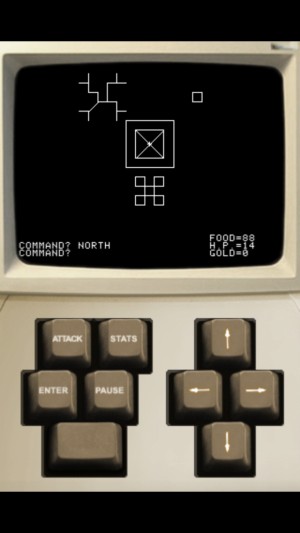 As an incredibly early entry in the genre, some of the familiar elements we take for granted can’t be found in Akalabeth, such as experience points or even a fleshed out magic system. Instead of experience and levels, the game simply raises your maximum HP when you exit a dungeon, based on how many monsters you killed. Your stats can be increased by finishing British’s quests, or by playing around with a magic amulet. The amulet serves as the game’s entire magic system. The amulet can cast four different spells, and though a fighter can use it, he can’t control which spell comes out. In exchange, he can use a couple of weapons that the mage can’t. It’s a bad deal, trust me. Pick the mage. In doing so, you can control which spell the amulet casts, and that’s useful for a variety of reasons. First of all, the mage can use the amulet to create ladders that allow you quickly get out of a dungeon or head down to a deeper floor, and both of these things are very useful to be able to do at will. The other great use of the amulet is to try your luck at the Bad?? spell, which produces a random effect and is the key to breaking Akalabeth over your knee.
As an incredibly early entry in the genre, some of the familiar elements we take for granted can’t be found in Akalabeth, such as experience points or even a fleshed out magic system. Instead of experience and levels, the game simply raises your maximum HP when you exit a dungeon, based on how many monsters you killed. Your stats can be increased by finishing British’s quests, or by playing around with a magic amulet. The amulet serves as the game’s entire magic system. The amulet can cast four different spells, and though a fighter can use it, he can’t control which spell comes out. In exchange, he can use a couple of weapons that the mage can’t. It’s a bad deal, trust me. Pick the mage. In doing so, you can control which spell the amulet casts, and that’s useful for a variety of reasons. First of all, the mage can use the amulet to create ladders that allow you quickly get out of a dungeon or head down to a deeper floor, and both of these things are very useful to be able to do at will. The other great use of the amulet is to try your luck at the Bad?? spell, which produces a random effect and is the key to breaking Akalabeth over your knee.
One of the random effects turns you into a lizard man, which gives your stats a massive boost. When it will come up depends on the lucky number you gave at the start of the game, but once you’ve sussed out its pattern, you can punch air to pass turns and reliably get the lizard man spell. A few boosts and you’ll be set for the rest of the game, if you’re so inclined. If you want to leave things up to the fates, you’ll discover the spell has other possible effects, all of which are negative. Amulets break after a random number of uses, so you’ll want to stock up on them whenever you stop by a town between dungeon plunges. You’ll also want to stock up on food, because even if you have the best stats in the world, starvation is still a very real threat. One of the monsters you’ll encounter, the gremlin, can steal half of your food with a single action, and a bout of bad luck can have even a massive food supply whittled down to almost nothing in the blink of the eye. Your other items are susceptible to being looted by the thieves you’ll occasionally encounter. Well, no one said things would be easy. Luckily, since treasure chests respawn along with the monsters whenever you leave a dungeon and come back, it’s not that hard to gather up more gold.
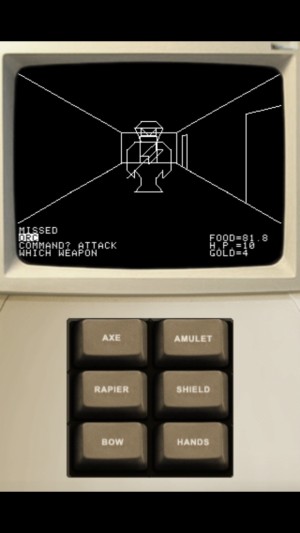 The dungeons themselves are primitive but still kind of fun to explore. They’re not nearly as big or trap-filled as those found in games that would soon follow such as Wizardry, but they’re also complex enough that you’ll want to keep some sort of a map, especially if you’re playing a fighter. This version of the game adds a number of elements to make the game a bit easier to deal with, and most of them are aimed at making the dungeons a bit easier to swallow. All of these assists are optional and can be flicked on or off as you like. There’s a mini-map, the ability to turn off secret passages, extra food added to chests, and the option to start your quest near the castle so that you don’t starve looking for the start of the game. You can also have your keys labeled by what they do rather than the somewhat obscure hot-key set-up of the original game. By default, all of these options are on except for the mini-map, and I don’t think anyone would hold it against you if you made full use of them. The game also seems to have had references to Mondain, the antagonist of Ultima, scrubbed out, leaving the already-bare story nearly non-existent. Oh, and unlike the original game, your progress is saved in the iOS version when you exit.
The dungeons themselves are primitive but still kind of fun to explore. They’re not nearly as big or trap-filled as those found in games that would soon follow such as Wizardry, but they’re also complex enough that you’ll want to keep some sort of a map, especially if you’re playing a fighter. This version of the game adds a number of elements to make the game a bit easier to deal with, and most of them are aimed at making the dungeons a bit easier to swallow. All of these assists are optional and can be flicked on or off as you like. There’s a mini-map, the ability to turn off secret passages, extra food added to chests, and the option to start your quest near the castle so that you don’t starve looking for the start of the game. You can also have your keys labeled by what they do rather than the somewhat obscure hot-key set-up of the original game. By default, all of these options are on except for the mini-map, and I don’t think anyone would hold it against you if you made full use of them. The game also seems to have had references to Mondain, the antagonist of Ultima, scrubbed out, leaving the already-bare story nearly non-existent. Oh, and unlike the original game, your progress is saved in the iOS version when you exit.
Apart from these changes, however, this is more or less a faithful adaptation of the Apple II version. The added color and music found in the Ultima Collection version aren’t in here, which I’m fine with because it was kind of weird to jam Ultima 3‘s music into the game anyway. Apart from the odd beep here and there, the only audio you’ll hear is the sound of the key presses, which have been added in by the developer. As for the graphics, well, as good a designer and storyteller as Lord British is, he’s not much of an artist, but the vector graphics sort of look like what they’re supposed to. At the very least, it moves a lot smoother than the choppy Apple II version of the game. You’ll probably have to consult a manual to figure out what’s what on the overworld, but basically, dungeons are represented by Xs, British’s castle is a big X in a square, and towns look like five little squares grouped together.
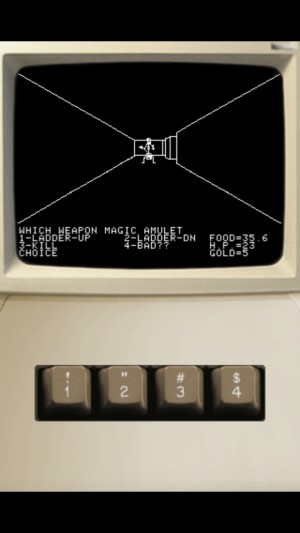 That’s more or less all there is to Akalabeth. Finishing the game on the highest difficulty encourages you to report your feat to Lord British himself, which I suppose you can easily do nowadays with the magic of Twitter, but other than that, there’s no real incentive to playing on except for the sake of challenge. More than any other game we’ve looked at in RPG Reload, Akalabeth falls heavily into the category of games that are best appreciated as historical curios than something enjoyable to play, but within that category, it’s actually not that bad. It’s at least playable. At least, as long as you’re not on an iPad. This version of the game hasn’t been updated in a very, very long time, and has no support for the iPad, larger screen sizes, Retina displays, or any of that nice stuff. I mean, it still has an OpenFeint symbol in its icon. While I was able to play through the game just fine on my iPhone, the keys stopped responding when I tried it on the iPad. It’s a shame, because this is basically the only sign of Ultima left on the App Store, so it would be nice if everyone could enjoy it. Assuming you’re not playing on an iPad, it’s certainly worth a couple of bucks to get a crash-course in RPG history, and you might even have a little fun along the way.
That’s more or less all there is to Akalabeth. Finishing the game on the highest difficulty encourages you to report your feat to Lord British himself, which I suppose you can easily do nowadays with the magic of Twitter, but other than that, there’s no real incentive to playing on except for the sake of challenge. More than any other game we’ve looked at in RPG Reload, Akalabeth falls heavily into the category of games that are best appreciated as historical curios than something enjoyable to play, but within that category, it’s actually not that bad. It’s at least playable. At least, as long as you’re not on an iPad. This version of the game hasn’t been updated in a very, very long time, and has no support for the iPad, larger screen sizes, Retina displays, or any of that nice stuff. I mean, it still has an OpenFeint symbol in its icon. While I was able to play through the game just fine on my iPhone, the keys stopped responding when I tried it on the iPad. It’s a shame, because this is basically the only sign of Ultima left on the App Store, so it would be nice if everyone could enjoy it. Assuming you’re not playing on an iPad, it’s certainly worth a couple of bucks to get a crash-course in RPG history, and you might even have a little fun along the way.
Normally this is where I’d wrap things up, but I have a podium here, so I’m going to use it. I really wish EA would bring the Ultima series to iOS. We got a port of Ultima 4 when EA was pushing Ultima Forever, but it’s since been pulled, and there’s not even the slightest rumbling or whisper that any of the other games will come. Most of the series is still very enjoyable to play, and at the very least, I’m sure Ultima 7 would do big business with mobile gamers. It’s one of the most important series in the history of computer gaming, and it’s terrible that EA doesn’t make the games more widely available. I can find Final Fantasy games and Dragon Quests everywhere, but Ultima, the SSI Goldbox Dungeons & Dragons games, and Wizardry are, for whatever reasons, condemned to obscurity. These games are an important part of gaming’s history and they really deserve a shot on other platforms. Okay, I’ll get off my soap box now.
Akalabeth isn’t really the sort of game you play out of context for a good time, but it does provide a fascinating look into the earliest steps of both the genre on the whole and one of the people responsible for shaping it. There’s not a lot to it, but it’s easy to digest over the course of a day or so, making it well-suited to the mobile platform. I’d love to see it updated to bring it up to speed with newer hardware, but at the very least, I’m happy it’s still hanging around the App Store. What do you think of Akalabeth? Feel free to share your thoughts in the comments below, in the Official RPG Reload Club thread, or by tweeting me at @RPGReload. As for me, I’ll be back next week with the first reader’s choice of the year, Knights Of Pen & Paper. Thanks for reading!
Next Week’s Reload Hint: As requested, it’s Knights Of Pen & Paper!
